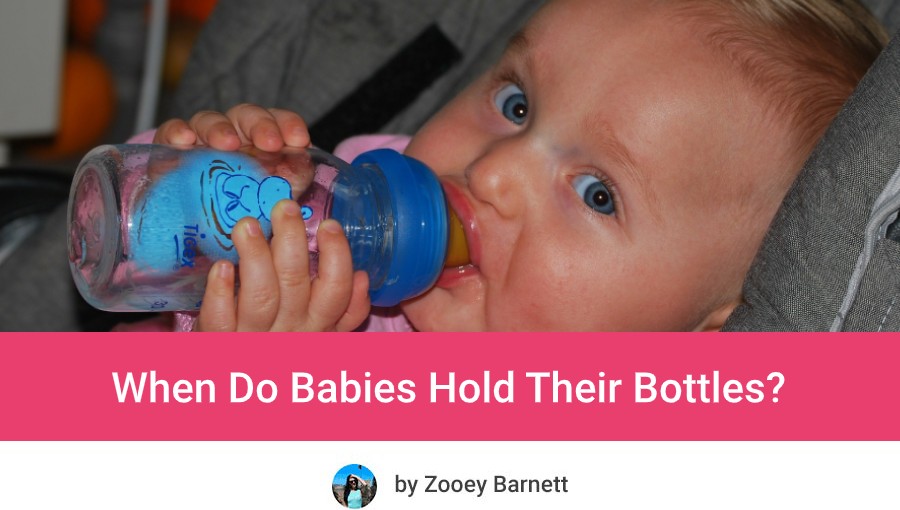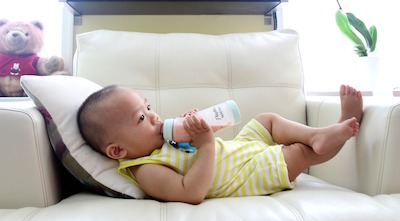When it comes to our little ones, we get very excited when they reach the major milestones in their development, like turning over, crawling, walking, and talking. It is just as important to appreciate the smaller achievements, such as being able to hold up their head on their own or hold a bottle by themselves.

This article in NOT a substitute for medical advice
When Can Babies Hold Their Own Bottles – Average Age
Babies can start holding their bottle on average between 6 to 10 months. Yours might be a little more independent and start earlier, or it is possible they like you doing the work for them and take a bit of time to get the hang of it.
A big part of when your baby is ready to break out on their own will depend on the development of their strength and motor skills. To help them along, make sure to give them lots of tummy time, as this builds up the baby’s core muscles and upper body strength.
Signs that baby is ready to hold the bottle
As your baby grows and gets more independent, they will want to do things by themselves such as holding the bottle. Even though they are becoming more independent, don’t worry. They will still need you until they are a teenager… when they know absolutely everything. But for now, get ready to enjoy having a free hand as your baby takes control.
Here are some signs that show your baby may be ready to start holding a bottle on their own:
- If your little one starts reaching for the bottle during feeding or puts hands on the feeding bottle while eating
- Your baby can sit up on their own for around 10 minutes.
- As your baby is sitting, he/she can stay balanced while playing with a toy in one hand.
- Reaching out and picking up objects while sitting upright.
These are signs of good core strength and coordination, which your bundle of joy will need to carry out for the task of holding that bottle and start allowing you a little hands-free time.

How To Get Your Baby To Hold Their Own Bottle
Generally speaking it’s not worth to speed up this milestone or force the baby to hold the bottle. But of courage you can encourage baby and help them to gain strength and practice their gross and fine motor to be able to do this.
- You can help your baby improve their ability to hold the bottle on their own by putting their hands on the bottle and guiding it to their mouth.
- Demonstrate the motions of drinking from a bottle to your baby since babies learn by watching and trying to imitate what mommy and daddy do. All this will help to develop your baby’s motor skills and cognitive process.
- Let your baby be the judge as to when they have had enough, don’t force them to drink more, they know when they have had enough.
- Practice back and neck strength for example during tummy time.
- Engage your baby in activities that help them to practice fine motor skills (finger movement precision).
Does Every Baby Need To Hold Their Own Bottle?
In a word, no. Holding their own bottle is a great skill, but one they will need for only a year or so, after that, you may want to start to wean your little one off the bottle. If you are breastfeeding your baby, they may go straight to drinking from a sippy cup or cup.
Dangerous Mistakes To Avoid
Once your baby starts holding the bottle on their own, it doesn’t mean you should just give it to them and go for a coffee, you still need to monitor them to keep them safe and make sure they don’t overeat.
Bottle Propping
What is bottle propping, and why should you avoid doing it? Simply put, bottle propping is using something to hold the bottle in a downward position so your baby can drink while leaving them unattended. This should be avoided at all costs because it is dangerous for your baby.
There is not just the chance of your baby overeating, but there is also the possibility of your baby choking and an increased chance of ear infections. Another risks of bottle-propping1 are: higher risk of tooth decay, as well as colic and gas (if the bottle slips your baby will be swallowing more air than milk). Your baby should never be left unsupervised when it comes to feeding time.
This time is not just to make sure your baby is getting all the nourishment they need but a time for bonding, and you should never ever miss an opportunity to have cuddle time!
Leaving Baby In A Crib With A Bottle
Although it might be tempting to leave your little one alone with their bottle now that they can hold it on their own, this too should be avoided. This can be very bad for your baby’s health over a period of time, and more importantly, it is an immediate danger!
Leaving the bottle in your baby’s mouth while in the crib can cause tooth decay2 due to the milk or formula collecting and sitting around their teeth overnight. You should give your baby’s mouth a little wipe after feeding and before they drift off to the land of dreams.
The most important reason not to leave your baby in the crib with a bottle is the possibility of choking. You must monitor your baby’s feeding time to ensure their good health and safety.
Letting Baby To Fall Asleep At The Bottle
Is it a good practice using a bottle to help your baby fall asleep or to sooth them? No. You do not want your baby falling into the habit of finding comfort in a bottle3 as it will be harder, in the long run, to get your little one to sleep once you stop using it.
Also, as mentioned above, using the bottle to help your baby to fall asleep can lead to tooth decay and the possibility of choking. Try to feed your baby before the nap time or before it’s time to go to bed for the night.

Safe Bottle-Feeding – Tips
If you are going to use a bottle for feeding4, remember a few simple rules:
- Make sure to properly clean bottles and nipples in hot water and dishwashing detergent and rinse under hot water, or simply use your dishwasher if you have one. It’s also recommendable to sterilize them for example in a microwave steam sterilizer.
- Warm the formula or breastmilk previously stored in the fridge or freezer, to about room temperature (approx. 23°C or 72°F). Always test the liquid in the bottle by putting some on the inside of your wrist as the liquid inside may be a different temperature than what the bottle feels in your hand. >>Read more about breast milk storage and preparation
- Get yourself and your baby into a comfortable feeding position and take care to note your baby’s intake. Don’t forget to take breaks for a burp or two (the baby, not you) while feeding.
So remember, although it is great to watch your baby grow and be more independent, they still need you to take care of them and ensure they are growing up safe… with LOTS of love and cuddles.
The purpose of this article is informative. It’s not a substitute for medical consultation or medical care. The author of this article does not accept any responsibility for any liability, loss or risk, personal or otherwise, incurred as a consequence, directly or indirectly, from any information or advice contained here.

